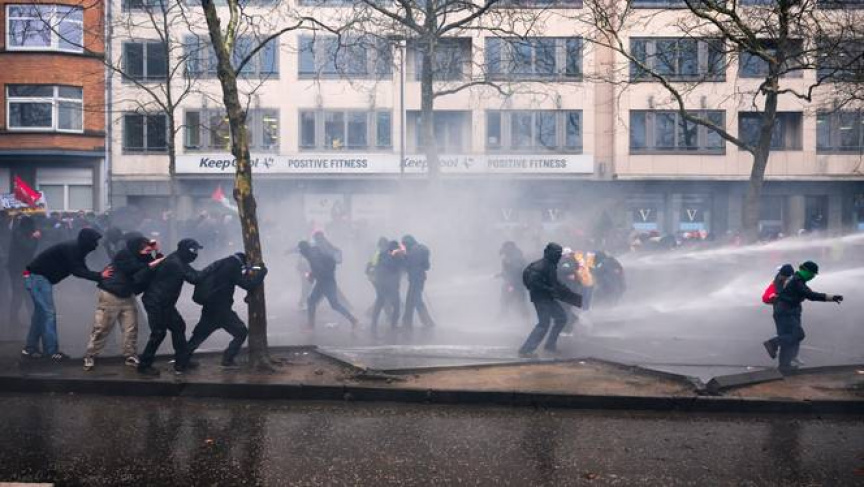
Police fired tear gas and water cannon at some of the tens of thousands of people who took to the streets of Brussels, as a nationwide strike against the new Belgian government's austerity measures grounded planes. (Photo/AFP)
Police fired tear gas and water cannon at some of the tens of thousands of people who took to the streets of Brussels, as a nationwide strike against the new Belgian government's austerity measures grounded planes.
Flemish nationalist Bart De Wever took office as prime minister on February 3 after months of coalition talks following Belgium's elections in June last year.
But trade unions have been incensed by his push for pension reforms as Belgium gets to grips with a budget deficit whose size violates EU rules.
De Wever has vowed to rein in spending as Belgium faces potential sanctions from the European Union if it fails to take effective steps to address the ballooning deficit.
Protesters in Brussels held placards saying: "We're not lemons", "When will we tax the rich?" and "Stop fleecing us", reflecting concerns at the rising cost of living.
AFP journalists saw police use water cannon and tear gas against some masked protesters, who threw objects including a fire extinguisher at the officers, outside the headquarters of one of the coalition government's five parties.
According to Brussels police, there were "several arrests " at the protest, which it said 60,000 people took part in.
Pensions schemes threatened
Large numbers of soldiers, teachers, railway workers, police officers and firefighters took part in the protest because the government's move to remove special pension schemes particularly affected them.
"The measures suggested in the government agreement are completely unacceptable," said William, a 45-year-old soldier, angry at the prospect of having to work until 67 and not 56 as planned.
The government's changes include a new method for calculating pensions that will no longer take into account career breaks, a change viewed as penalising women.
The strike and the demonstrations were called by Belgium's three major unions — Christian, Socialist and Liberal.
Thursday's protests were twice as large as the strike on January 13, when around 30,000 people marched in Brussels to defend public services and pensions.
There were major disruptions to public transport, and all planes departing Brussels' two major airports were cancelled because of a lack of air traffic control.
De Wever insists Belgium faces an enormous challenge, describing the country's budgetary situation as "the worst in the Western world".
Belgium's budget deficit is expected to reach 4.6 percent of national economic output in 2024, and EU rules stipulate that it should be below three percent.
___
Source: TRT